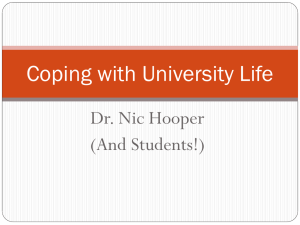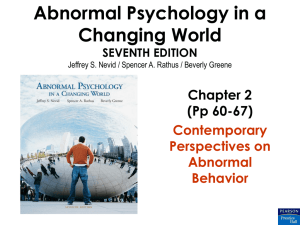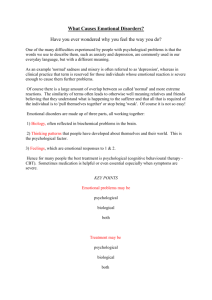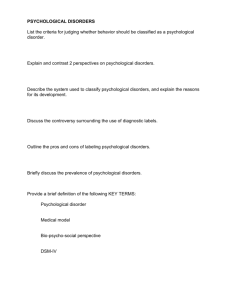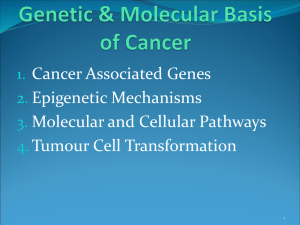Unit 8: Psychological Disorders and Therapy
advertisement
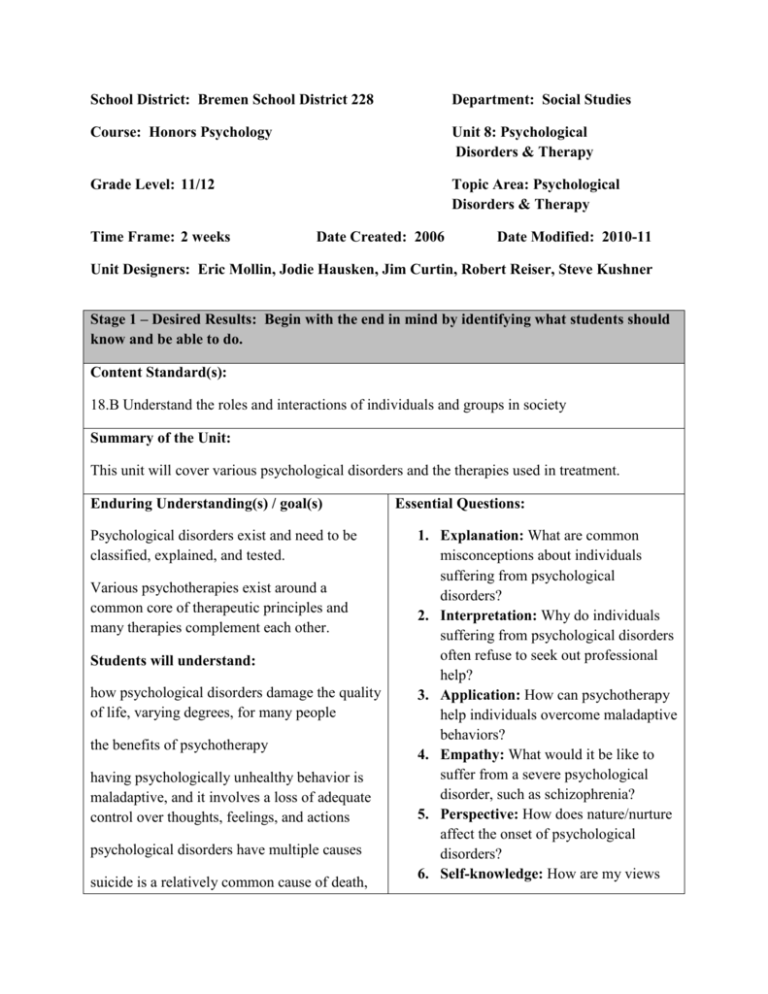
School District: Bremen School District 228 Department: Social Studies Course: Honors Psychology Unit 8: Psychological Disorders & Therapy Grade Level: 11/12 Topic Area: Psychological Disorders & Therapy Time Frame: 2 weeks Date Created: 2006 Date Modified: 2010-11 Unit Designers: Eric Mollin, Jodie Hausken, Jim Curtin, Robert Reiser, Steve Kushner Stage 1 – Desired Results: Begin with the end in mind by identifying what students should know and be able to do. Content Standard(s): 18.B Understand the roles and interactions of individuals and groups in society Summary of the Unit: This unit will cover various psychological disorders and the therapies used in treatment. Enduring Understanding(s) / goal(s) Psychological disorders exist and need to be classified, explained, and tested. Various psychotherapies exist around a common core of therapeutic principles and many therapies complement each other. Students will understand: how psychological disorders damage the quality of life, varying degrees, for many people the benefits of psychotherapy having psychologically unhealthy behavior is maladaptive, and it involves a loss of adequate control over thoughts, feelings, and actions psychological disorders have multiple causes suicide is a relatively common cause of death, Essential Questions: 1. Explanation: What are common misconceptions about individuals suffering from psychological disorders? 2. Interpretation: Why do individuals suffering from psychological disorders often refuse to seek out professional help? 3. Application: How can psychotherapy help individuals overcome maladaptive behaviors? 4. Empathy: What would it be like to suffer from a severe psychological disorder, such as schizophrenia? 5. Perspective: How does nature/nurture affect the onset of psychological disorders? 6. Self-knowledge: How are my views but it many cases it can be prevented on psychotherapy shaped by the media and social stigmas? Key Words: DSM-IV, schizophrenia, mood disorder, somatoform disorder, anxiety disorder, personality disorder, dissociative disorder, cognitive disorder, eating disorder, substance related disorder, sexual gender identity disorder, insanity, psychosis, delusion, hallucination, psychotherapy, psychoanalysis, humanistic therapy, behavior therapy, operant therapy, cognitive therapy, group therapy, electro compulsive therapy Student objectives (outcomes): Students will be able to: Differentiate between normal and abnormal behavior Differentiate between various psychological disorders. Differentiate between the different types of therapies. Students will know: The purpose and use of the DSM-IV in psychological disorders. The different categories of psychological disorders. The various types of therapies used and when to use them in treating psychological disorders. Stage 2 – Assessment Evidence: Establish evidence of student understanding through Performance Tasks and other assessments. Performance Task (GRASP): Other Evidence: Psychological Disorder Brochure Reading case studies: identifying psychological disorders Andrea Yates debate/analysis on the insanity defense plea Stage 3 – Learning Plan: Create learning experiences and instruction that promote student understanding through the WHERETO process. Learning Activities: What sequence of teaching and learning experiences will equip students to develop and demonstrate the desired understandings? W = How will you ensure that all students know where they are headed in the unit, why they are headed there, and how they will be evaluated? Lesson plan objectives provided. Rubrics will be used as an assessment tool UbD Stage 1 “Identifying Desired Results” provided for students. UbD Stage 1 “Identifying Desired Results” will be assessed as a unit test. H = How will you hook students at the beginning of the unit? (Unit Specific) Put an arrow on the board with “normal” written on one side and “abnormal” written on the other side. Students will discuss what it means to be labeled “abnormal” and how society and the individual suffering identities maladaptive behavior E = What events will help students experience and explore the big idea and questions in the unit? How will you equip them with the needed skills and knowledge? (Unit Specific) Teachers will have students read case studies of individuals suffering from psychological disorders Teachers will have students watch documentaries/video clips of individuals suffering from PTSD, schizophrenia, bipolar disorder, eating disorders...etc. Teachers will give students excerpts from the DSM-IV R = How will you cause students to reflect and rethink? How will you guide them in rehearsing, revising, and refining their work? Students will participate in journal entries Students will be exposed to modern therapy techniques E = How will you help students to exhibit and self-evaluate their growing skills, knowledge, and understanding throughout the unit? (Unit Specific) Students will create and participate in hands on activities to reinforce concepts learned about psychological disorders and psychotherapy. T = How will you tailor and otherwise personalize the learning plan to optimize the engagement and effectiveness of ALL students, without compromising the goals of the unit? Multiple intelligence research will be utilized in creating assessments. EPAS reading scores will assist teachers in tailoring instruction and assessment. Students will be given a variety of assessment choices. O = How will you organize and sequence the learning activities to optimize the engagement and achievement of ALL students? (Unit Specific) Students will first understand abnormal behavior Students will then learn the causes of psychological disorders Students will then learn psychotherapy techniques to overcome disorders
